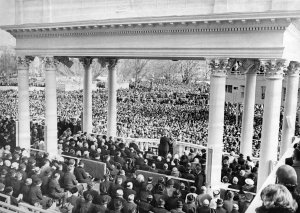America had other foreign problems in 1965, and as usual there were problems with President De Gaulle of France. Cool in recent years, our relations with France were further chilled when evidence was produced that an American reconnaissance plane had photographed a secret French military installation. De Gaulle had his own problems at home. He was humiliated in December when the French refused him the frank and massive endorsements he asked for, in a broadcast political campaign he had hoped he wouldn’t need.
De Gaulle was forced to obtain his new sever year term after a degrading run off election against left wing candidate François Mitterrand. Still De Gaulle did stay in. Less fortunate was Ahmad Ben Bella, a bloodless coup throughout the former Algerian Premier.
Another bloodless military coup deposed Premier Kasavubu of the Congo.
In Indonesia, Dictator Sukarno was almost knocked out by a communist coup, but the military saved him and started the first purge of communists in that island nation's modern history.
In Russia a mild Kremlin shakeup ousted President Mikoyan. The old Bolshevik was replaced by Nicolai Podgorney one of the new look bureaucrats.
A full-fledged war was raging on the Indian subcontinent. The disputed territory of Kashmir once again was the object of fighting between India and Pakistan. First came ground skirmishes then the bombing of major cities. Correspondent John Barton watched the effect on New Delhi.
John Barton: "I saw this capital of India become a capital of darkness tonight, as lights went out all over the city for protection against possible air raids. I also saw many Delhi residents today busy digging deep trenches around their houses to be used in case shelter is needed."
Pie Chamberlain: The United Nations Security Council with the United States and Russia acting in concert for the first time in years unanimously called for and obtained a cease-fire. The dispute is still not settled but a shaky truce prevails for the time being. In Africa new trouble was growing in Rhodesia. Premier Ian Smith threatened for weeks then finally acted to breakaway from Great Britain.
Ian Smith: "We have struck a blow for the preservation of justice, civilization, and Christianity, and in the spirit of this belief we have this day assumed our sovereign independence."
Pie Chamberlain: Premier Smith drew the wrath of the entire world except for South Africa, Portugal, and the Portuguese colonies all of which have similar racial policies.











